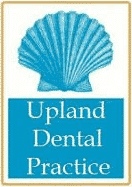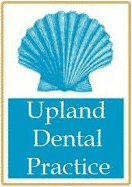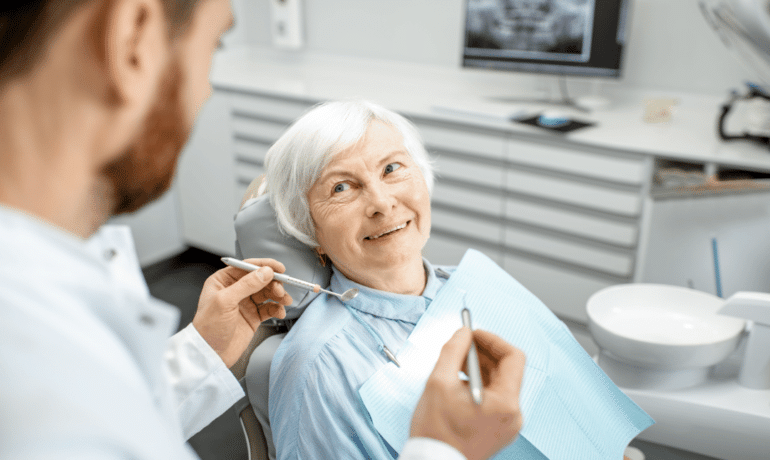Reduced capacity for self-care among the elderly often has a big impact on their oral health. And dental care for the elderly can be more challenging because of their declining general health and mobility. As a result, a large population of elderly people experience toothlessness or edentulism.
This warrants the need among family members and guardians further understanding of how older individuals perceive their oral health and dental care.
In this article, we’ll cover everything you need to know about caring for the oral health of your older loved ones. This guide discusses common dental issues among seniors, their impact on overall health, and concrete actions you can take to promote optimal dental care.
Let’s begin!
Common Dental Issues in the Elderly
Dental problems can influence seniors’ nutrition, speech, and lifestyle. It’s therefore essential to recognize and address these issues to maintain not only oral health but also overall well-being.
That being said, here are some of the most common dental issues in older people.
Periodontal Disease
Gum disease, also called periodontal disease, is a serious gum infection that affects about 45-50 % of adults. Periodontal disease is a long-term inflammation that can become untreatable if it progresses to periodontitis. It affects the tissues supporting the teeth, leading to gum recession, bone loss, tooth mobility, and eventual tooth loss. Gum recession also increases the risk of root cavities, which are common in older adults.
Similarly, tooth mobility and loss can reduce chewing ability, cause psychological stress, and negatively impact daily life and quality of life.
Although periodontal disease affects approximately 45–50% of adults in its mildest form, a global review indicated that 11% of the population experiences severe periodontitis. In the U.S., about 66% of individuals aged 65 and older have periodontitis, with up to 23% of them suffering from severe cases.
Symptoms to Watch Out For
- Gum Bleeding
- Persistent Bad Breath
- Swollen or Tender Gums
- Receding Gums
- Loose or Shifting Teeth
- Pockets Between Teeth and Gums
- Changes in Bite
Dry Mouth (Xerostomia)
Dry mouth is what you think it is—it is the feeling of not having enough saliva in the mouth. Common causes of dry mouth in older adults include dehydration, reaction to certain medications, and losing more fluid with less intake. Common causes of dry mouth in older adults include dehydration, reactions to certain medications, and an imbalance between fluid loss and intake.
Also, medical conditions such as diabetes, HIV/AIDS, and can also cause dry mouth. Older people who are undergoing chemo or radiotherapy also have a higher risk of xerostomia as drugs used to cure cancer can thicken the saliva which causes the mouth to feel dry.
Seniors who have dry mouth might find it more challenging to swallow and digest food as saliva plays a vital role in these processes. The inability to process food properly due to lack of saliva may result in increased tooth decay, bad breath, and other oral health issues.
Root and Coronal Issues
According to a study, elderly people living in care facilities often have more dental problems, including tooth decay. This is linked to higher levels of disability and dependence among these individuals. Factors contributing to dental issues include having existing plaque, exposed root surfaces, reduced saliva, high sugar intake, and root and coronal issues.
Root and coronal issues relating to old age are a common phenomenon due to the increasing life expectancy of dentition. This means that as people live longer and keep their natural teeth for more years, older adults are more likely to develop root caries (cavities on the roots of their teeth) and gingival recession (gum recession). In fact, nearly half of all individuals aged 75 and older have root caries.
The challenges of maintaining oral health become more pronounced in older adults due to the increased incidence of the abovementioned oral health problems.
Navigating dental care for older adults can be challenging not only due to the increased prevalence of certain medical conditions but also because of insurance limitations and financial constraints. Here’s a closer look at the insurance landscape and available options to help manage these barriers.
Barriers to Dental Care for Elderly Patients
Medical conditions aren’t the only barriers to proper dental care for elderly patients. Older people struggle to keep up with their oral health care because of five primary reasons:
Cost
According to Bruce Dye, DDS, MPH, professor and chair of the Department of Community Dentistry and Population Health at the University of Colorado School of Dental Medicine, while Americans gain access to medical care at age 65 and older, the same access does not extend to dental health, despite the well-established connection between oral health and overall health.
He explained that dental insurance is typically tied to employment, with coverage provided through an employer to the policyholder. However, this coverage is often lost upon retirement.
Fear
Dentophobia, or dental anxiety in older adults can manifest in various ways. Common contributing factors include past negative or traumatic dental experiences, pain, pressure from family or peers, and individual personality traits. In some instances, patients may have encountered unprofessional behavior from their dentists.
Environmental triggers can also play a significant role, such as fear of needles or blood, the sound of dental drills, the sight of other anxious patients, unpleasant odors in the clinic, feeling vulnerable while reclined in a dental chair, and the discomfort of receiving local anesthesia injections.
Lack of Perception of a Need for Dental Care
Older people tend to overlook or dismiss the need for dental treatment, even when facing oral health issues. Driven by the belief that their current dental condition is adequate, older patients neglect dental visits and ignore issues such as loose dentures, missing teeth, and cavities.
Practical Tips to Help Older Patients with Dental Care
To overcome the barriers to dental care for elderly patients, it’s important to focus on practical steps that can improve their oral health despite challenges like cost, fear, and lack of perceived need. Here are some tips:
- Encourage Routine Oral Hygiene: Even without regular access to dental visits, older patients can maintain good oral health through consistent home care. Encourage brushing teeth twice daily with fluoride toothpaste and cleaning between teeth using floss or interdental brushes. For those with limited dexterity, consider electric toothbrushes or special grips that make brushing easier. An extra hand would also help them navigate through the process.
- Regular Denture Care: Initiate a regular denture care regimen to prevent plaque buildup, gum disease, and bad breath. Add it to their to-do list for the day by reminding them to remove and clean their dentures daily using a denture brush and a non-abrasive cleaner. Encourage them to soak dentures overnight in water or a denture-cleaning solution.
- Schedule Regular Dental Check-ups: Even if cost and fear are significant barriers, finding affordable dental care options like community health clinics, dental schools, or programs offering discounted services can make a difference. Getting them a personal dental membership can help them save at least $153 a year on essential preventive treatments.
Regular check-ups can also help catch issues early, reducing the need for more extensive, fear-inducing treatments later on.
- Promote a Balanced Diet: Nutrition plays a crucial role in oral health. Encourage elderly individuals to eat a balanced diet rich in vitamins and minerals, especially calcium and vitamin D, which are vital for maintaining strong teeth and bones. Limiting sugary snacks and drinks can also help reduce the risk of cavities.
Quality Dental Care for Seniors in Upland CA
Do the elderly still need to visit the dentist? Yes!
Older people are at the stage of their lives where things can become more challenging even a simple act of brushing. Therefore, we must offer ways to help them make oral health care more enjoyable and stress-free. It can be a challenging job, though. It requires patience, understanding, and a support team like dental experts to help you and your older family members every step of the way.
And here’s where we come in as your trusted oral health partners in Upland California! If you’re struggling with your family member’s oral health, book an appointment with us and together we’ll create a dental care plan that will suit their needs.


